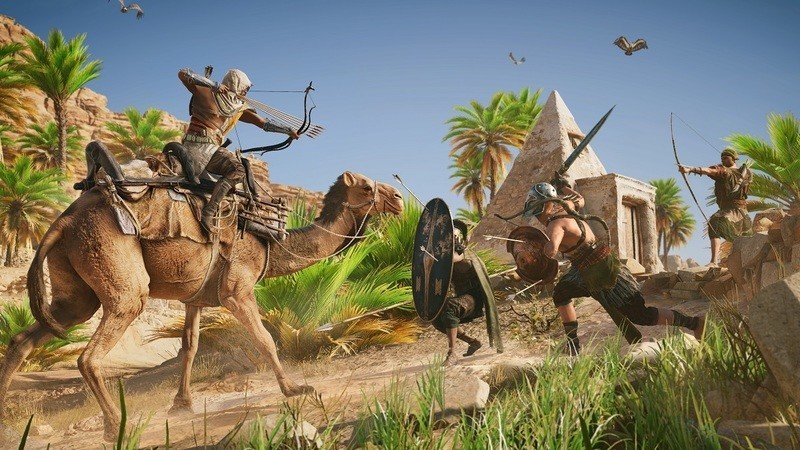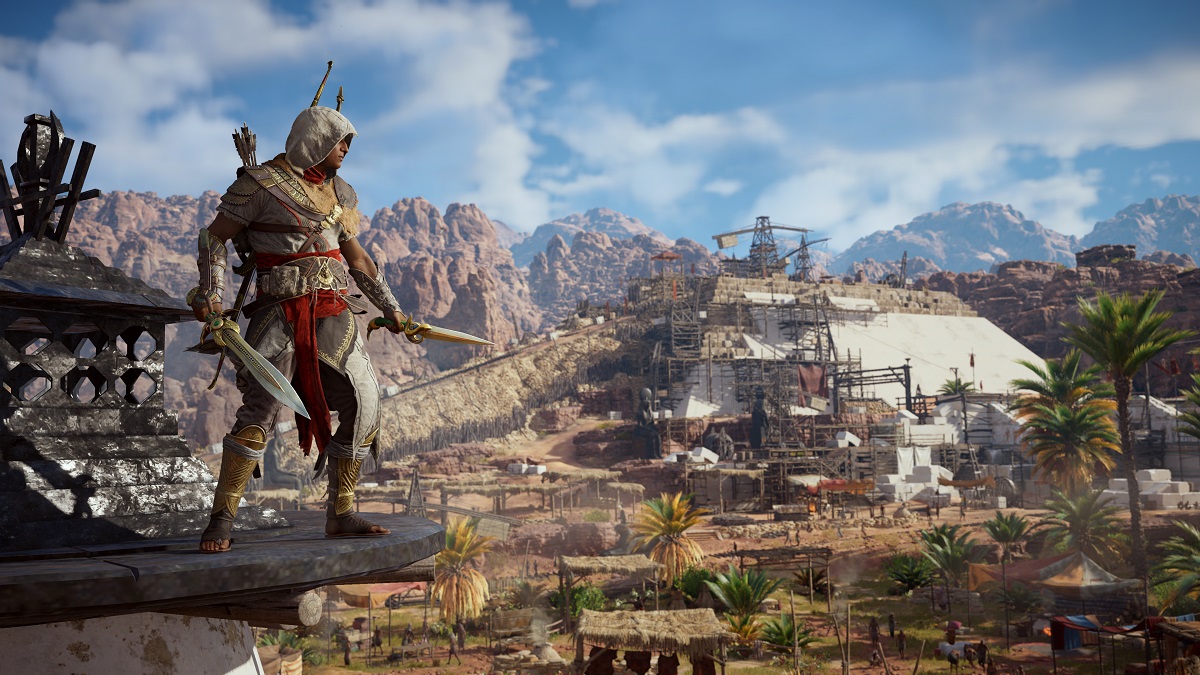Playing through Ubisoft’s massive and gorgeous “Assassin’s Creed: Origins,” one can’t help but be reminded of a golden age of Hollywood epic that they don’t really make that often anymore, at least not successfully. Sure, we get an “Exodus: Gods and Kings” and “Gods of Egypt” every now and then, but those films didn’t exactly set the world on fire the way that films like “Cleopatra” and “Ben-Hur” did in a different era. Even as recently as two decades ago, we were getting Oscar-winning “swords and sandals” films like “Gladiator” and “Braveheart,” but it’s a genre that seems to have given way to the wave of recent “intellectual sci-fi” (“Gravity,” “Interstellar,” “The Martian”) and, of course, the Marvel Cinematic Universe. Or is it just that expansive storytelling moved to a different medium? “Origins,” the first “AC” game since 2015’s disappointing “Syndicate,” is undeniably epic—it feels like a bigger game than possibly any other released for modern consoles. It can be overwhelming to a degree that sometimes makes it feel like a chore, but it can also be breathtaking in scope and setting. For that reason alone, it’s one of 2017’s must-plays.
The ”Assassin’s Creed” series has been a PS3 and PS4 staple for a decade now, earning raves for the first release in 2007 and then simply flooding the market with sequels and spin-offs. It got to a point where the games were coming so quickly—a major release every single year from 2009 to 2015—that one started to feel fatigue in the creative drive of the franchise. 2014’s “Assassin’s Creed: Unity” & “Assassin’s Creed: Rogue,” and 2015’s “Assassin’s Creed: Syndicate” were disappointments critically, each having elements that worked but each also failing to live up to the last truly great game in this series, 2013’s “Assassin’s Creed IV: Black Flag.” It was widely perceived that taking a year off from the holiday season of 2016 was a good idea, and we hoped the series would come back creatively revitalized.

In some ways, it has. Produced by the same team behind the brilliant “Black Flag,” who have reportedly been working on this game since that one, “Assassin’s Creed: Origins” is an undeniably ambitious game. Set in Ancient Egypt during the Ptolemaic period, “Origins” has one of the largest and most impressive video game worlds in history. It is a massive world of buildings and landscapes and animals and non-playable characters (NPCs) that feels as alive as any game this year in terms what’s happening on the fringe and past the horizon. It’s a game that makes you feel small within it, which actually takes some getting used to. We’re still accustomed to games in which “setting” really refers to only that which is happening around the protagonist—this setting feels like things are happening within it that have absolutely nothing to do with you. It’s magnificent, and the kind of game that makes one want to buy a PS4 Pro just to see what it looks like in 4K.
You play a Medjay named Bayek as Egypt is going through massive political upheaval. As in most “Assassin’s Creed” games, you are something of a revolutionary, trying to disrupt a corrupt system by either helping/saving rebels, assassinating opposing leaders, and other various story/side missions designed to increase your power and dismantle that of those who would seek to control the people. “Assassin’s Creed” games have a ton of mythology and back story (don’t even get me started on the often-dull present-day stuff and a form of time travel called the Animus) but they are essentially all stories of revolution—you are the one person willing to tackle the power structure and bring it crashing down.

To do so in “Origins” often requires a great deal of patience. As with a lot of games this epic, there are some missions that feel like chores. Go save this prisoner and bring him back. Go find this item and bring it back. They’re called “fetch missions,” and “Origins” is thick with them to a point where I found the first four-to-five hours relatively dull. It’s a sumptuous world, in which I’m doing the same thing over and over again. But at around that four-hour mark, it becomes something more special as the world continues to open up, the missions become more creative, and I felt a greater deal of authorship over how the story was unfolding.
It got me thinking, though: how many people are that patient with any form of entertainment? I feel like most people give up on a TV show before the five-hour mark, and some might even walk out on a movie if it’s not working for the first, say, 45 minutes, right? And yet there’s a different degree of patience with video games. The opening credits for this one don’t even pop up for about two hours. The creators know that people understand the time commitment involved in a game like “Assassin’s Creed.” So while I wish this game worked better from hour one, it’s not a dealbreaker for fans if I say that you have to be patient to enjoy it.

As the game unfolds, you notice more and more of the detailed design work put into it. NPCs feel like they’re moving completely independently—not on a predictable track—and even enemies have a stronger AI than most “Assassin’s Creed” games. I was on a mission in which I died at the very end and my second attempt played out entirely differently. Enemies responded and moved differently, and that sense of unpredictability and individual experience is something that has been missing from a lot of “AC” games. There’s also a fight mechanic here that takes some time to master. You will die a lot. But when you do learn what weapons work best for you (quicker weapons like short swords vs. longer-but-stronger ones like giant axes) and balance it with a strong arrow-based attack, the scope gets even wider.
So why has this kind of cinematic epic moved from films to games? Sure, it still exists on television, although really only in the form of “Game of Thrones.” But the filmgoer’s attention span has changed in the last 20 years and period-set storytelling from the 20th century may actually be better suited to video games, a medium in which people are willing to devote four-to-five hours before a game gets good. And this one gets pretty great.












